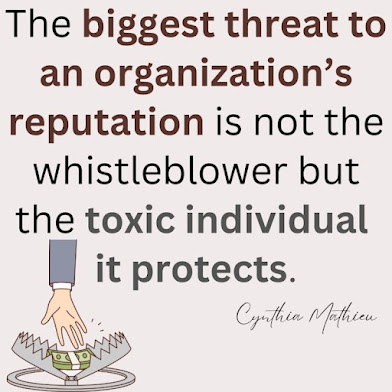...Academic bullying is ubiquitous. A survey of more than 2,000 academics (primarily post-doc and graduate students in life sciences) revealed 84% had experienced “sustained hostile behavior from one’s academic superior.” According to study coauthor and Wake Forest University business professor Sherry Moss, “those who had been bullied or abused were unlikely to report the abuse due to fear of retaliation.”
Silence, however, is a dangerous solution. “One thing that keeps coming up about bullying is the impact on people’s health—insomnia, panic, mania, anxiety, even suicidal ideation—because they feel trapped in a situation or organization that does not support them,” says Leah Hollis, associate dean of access, equity, and inclusion at Penn State University...
...Despite starting as a tenured associate professor, Keller recalls being essentially “ignored” by the department. Although most associate professors were promoted after three years, Keller remained one for a decade. After insisting that it was long overdue, the department relented and began the promotion process—but stopped it once she got pregnant. Eventually, Keller received the promotion, but the battle further ostracized her in the department.
... Rather than being ignored like Keller was, some instances of academic bullying aim to destroy a career. That is what happened to Nancy Olivieri, a University of Toronto pediatrics professor. In 1989, she started a clinical trial on a blood disease drug. When data revealed safety concerns about the drug, the pharmaceutical company that made it—and funding the study—curtailed the trial and threatened to sue her if she released the data. When Olivieri argued for more safety testing of the drug, the company did sue her, and her hospital tried to fire her and have her medical license revoked. Fortunately, the Canadian Medical Protective Association defended her...
Addressing academic bullying after it occurs isn’t enough; proactive solutions are needed. “Most higher education and research institutions have adequate policies and measures in place to reduce bullying, discrimination, and harassment,” says Janet Hering, professor emerita of environmental chemistry at the Swiss Federal Institute of Technology Lausanne. “They don’t work because they are not taken seriously and implemented.”
Ending systemic academic bullying might require even broader protection—like Title VII of the Civil Rights Act, which protects workers. “If I had a magic wand, there’d be federal legislation prohibiting workplace bullying,” says Hollis. “And it would be a serious part of the accreditation reviews of colleges and universities.”
From https://www.science.org/content/article/can-academic-bullying-be-stopped





